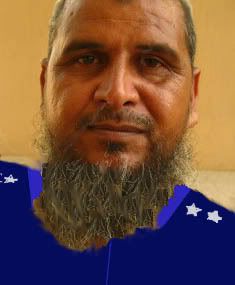Abdul Aziz Kantari

| |
|---|---|
| Gender | Male |
| Age | 48 (as of 3 February 2007) |
| Rank/Position | Major General, Kahanistan Republic Guard |
| Height | 170 cm (5'7") |
| Weight | 66 kg (145 lbs.) |
| Blood type | A+ |
| Frame | Robust |
| Hair/Eyes | Brown / Brown |
| I.Q. | 114 |
| Economic Left/Right | (-2.57) |
| Social Libertarian/Authoritarian | (1.56) |
| Religion | Shi'a Muslim |
| Education | B.S. in civil engineering, Kahanistan Military Academy, 1980, M.S. in mathematics, Kahanistan National University, 1993 |
| Hobbies / Interests | Ancient history, rock climbing, spiritual music |
| Languages spoken | Arabic, English, Greek, Latin |
| Weapon | Beretta M9, IMI Galil, IMI Tavor, AK-74 |
| Affiliation | Kahanistan Republic Guard |
| Service | Occupation of Torontia, Kraven War |
Abdul Aziz Kantari (Arabic: عبد العزيز الكنتاري, Abd al-Aziz al-Kantari), born 11 June 1958, in Al-Tahrir, Kahanistan, is a Kahanistanian military commander.
Early life
Kantari was born in 1958 to a devout Muslim family. He attended sermons at his local mosque every Friday since he was old enough to understand the imam. His mother and older sister wore veils without being forced to by his father, and impressed upon the young boy the importance of religion in daily life.
While he was raised by a conservative religious family, Kantari associated as a youth with many liberal Muslims and followers of other faiths. The ideas of liberalism he was exposed to moderated the views his parents had instilled in him, which although conservative, were by no means violent. He was convinced by an older friend who was in the Academy to sign up, which he did at age fourteen, in 1972. He was told that he could fight against repression and hatred, and this rang with his imam's calls for jihad (translated more accurately as "struggle", rather than the common translation as "holy war") against repression.
Military career
While in the Academy, Kantari became somewhat more secularised. While he never abandoned his religion, he no longer was as conservative as his parents, for example, adopting the belief that women should not have to wear heavy cloaks in desert climates. By the time he graduated, he had adopted Western civilian dress and occasionally even drank socially, though in general he avoided parties he knew alcohol would be served at.
In 1980, Kantari graduated the Kahanistan Military Academy with a B.S. in civil engineering and a commission as a second lieutenant. He was assigned to serve as commander of a combat engineering platoon, where he remained until he took over the company in 1984 as a Captain. Shortly afterwards, he was transferred to Intelligence, and from 1987 to 1990 he was a Major in command of the Presidential Security Detachment.
Upon his promotion to Lieutenant Colonel in 1990 (a result of his exposure of then-President Abdul Salim Mohammed's incriminating documents planning nuclear attacks on civilian population centers in several hostile states, to be blamed on anarchists to trigger a massive rebellion) Kantari went to Kahanistan National University to pursue a master's degree in mathematics. (Correspondence courses are very common in Kahanistan, especially among military officers pursuing master's and doctoral degrees.) In 1994, eight months after completing his degree, he was promoted to Colonel and reassigned to a logistics brigade, the 33rd Maintenance Brigade, which he assumed command of in 1999 upon his promotion to Brigadier General.
Torontia
Main article: Occupation of Torontia
Kantari arrived in Torontia in 2005 with the 33rd Maintenance Brigade, a logistical support unit of 5,000 troops. While his unit served relatively uneventfully, he was attached to a battalion of Imperial Marines, some of whom committed atrocities without his orders, citing the orders from General Feodor Kalazanov, who was the overall Kahanistanian commander at the time.
An Imperial Marine Captain, Joseph R. Danzig, who had served in the Freekish invasion and become mentally unbalanced after the loss of his family, murdered several dozen prisoners entrusted to his care. When Kantari arrived at the camp in order to countermand the orders to execute the prisoners, he learned that the Captain had taken care of the orders himself, killing several soldiers who had tried to stop him.
After the massacre, Kantari contacted President Mohammed bin Yusuf al-Za'if regarding the orders to kill prisoners, and was consequently reassigned to Kraven, where he served for the rest of the Torontian military conflict, returning after the Second Battle of Kravonika. Before his reassignment, he received a promotion to Major General and was moved to command of the 11th Division.
After the end of Freekish participation in the Kraven War, Kantari returned to Kahanistan, where he gave evidence and information to the Xirniumite Federation of Human Rights.
Personal life
Kantari is married and has one fourteen-year-old daughter, who is a cadet at Kahanistan Military Academy. He has stated that he hopes she will do as he did if ever called upon to violate the policies that the Republic Guard is based upon.
Notes
"Abdul" (عبد ال) is not an Arabic name, but a part of many given names that means "servant of," e.g. "Abdul Aziz," also romanised as "Abd al-Aziz" (عبد العزيز), means "servant of the Almighty." [1]
